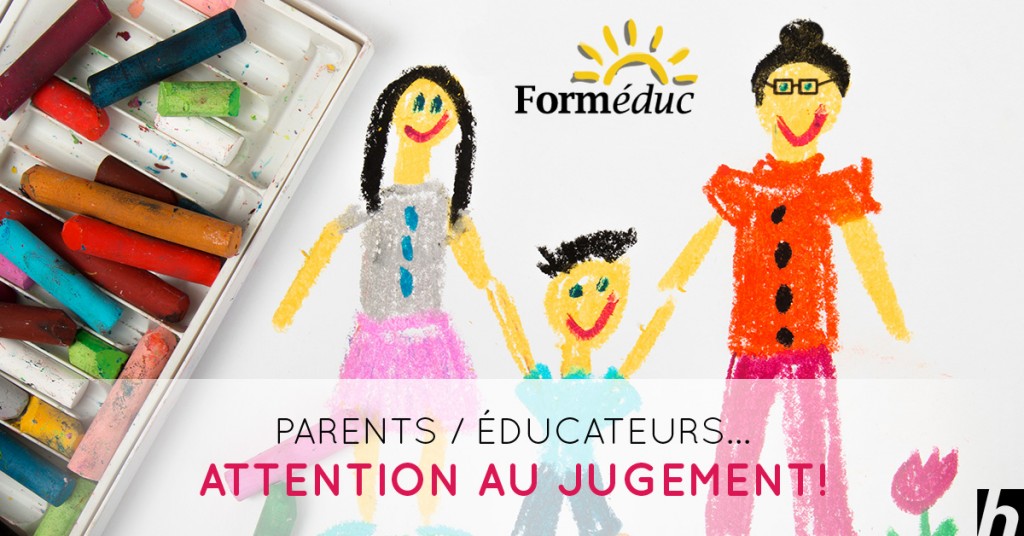

- 6 July 2023
- |
- Andrée Bouchard
Jules’ mother is on maternity leave. While she looks after the newborn at home, Jules continues to attend daycare full-time. This morning, on his way back from playing outside, his educator Michèle notices that he has wet his pants. As this never happens to Jules, she changes the child’s clothes and waits until the end of the day to explain to the parent that it’s difficult for a child to realize that he’s losing his place after the arrival of another child in the family, and to recommend that he reduce the number of days he attends to spend more time with his son, to prevent him from regressing. Jules’ mother tells Michèle that Jules is enthusiastic about joining his classmates in the morning, and that she has the impression that Michèle would like to lighten her workload.
The educator simply wanted to share her concerns and warn Jules of potential problems, and doesn’t understand why the mother doesn’t take more advantage of her time off to spend with her son. The mother, on the other hand, feels judged in her parenting skills and doesn’t understand why she should change a routine that hadn’t caused any problems until now.
Michèle admits she may have jumped to conclusions and apologizes. Jules only wet himself once, after all. But the damage is done. The bond of trust, so difficult to create between a parent and an educator, has just been weakened.
Parents are their children’s first educators
The vast majority of parents are concerned about their children’s well-being and education. In this sense, they deserve consideration and support. Like educators, they play their role with their children according to their respective values. It’s important to realize that these values, even if they are sometimes different, can coexist very well, as long as everyone shows a minimum of openness and respect.
The educator/parent partnership implies that everyone works together to promote the child’s well-being and harmonious development. If a difficulty arises, it’s to everyone’s advantage to discuss the matter openly, in order to develop joint intervention strategies and ensure consistency between their actions. Discussions and exchanges of information enable them to support each other in the exercise of their respective skills, and should not be used to pass judgment on the other’s way of doing things.
The educator is often the first to witness what the child is doing or experiencing. Consequently, when a difficulty arises, it’s her job to inform the parents of any concerns she may have about the child. Parents must not be left in a state of worry, or even ignorance, and the child must not be left in a situation that is likely to get worse.
Here are 3 ways to facilitate communication between the educator and the parent:
Recognize that everyone is entitled to their own opinion
The important thing is not that everyone should have the same opinions and agree on the course of action, but rather that everyone should have the chance and the time to express their own point of view. From the outset of a discussion, let the parent know that what you’re about to say is important to you. And if, along the way, you feel they’re not listening, let them know so they can adjust. For example: “I feel you’re distracted and what I have to say is important… would you like to continue this conversation another time?” or “I feel you’re being defensive… let me reassure you right now, I’m not being judgmental, I just want to discuss the situation with you”.
Choosing the right moment
When a difficulty arises, before approaching the parent, it’s important to find the time that suits you all, so that you all feel at ease. Try to take the first step… on tiptoe. For example, avoid talking about a problem when the parent has just picked up their child and is in a hurry to prepare supper, or when their attention is monopolized by their child. Choose the best time together. Choosing the right time to deliver a message to parents is almost as important as the message itself…
Talking about children in positive terms
No parent likes to be talked about in negative terms. When the educator wants to talk to the parent about the child, she can use the technique of placing a negative element between two positive ones. This exercise forces the educator to reflect on the positive aspects of the child, and to recognize that it’s not all failure. For the parent, this approach enables him or her to better perceive the positive intent of the educator’s intervention, and consequently helps strengthen the bond of trust they have with their child’s educator.
All these aspects help to establish a bond of trust, which is essential to a harmonious relationship between the parent and the child’s educator. Although parents may occasionally disagree, they remain the educator’s best allies.




